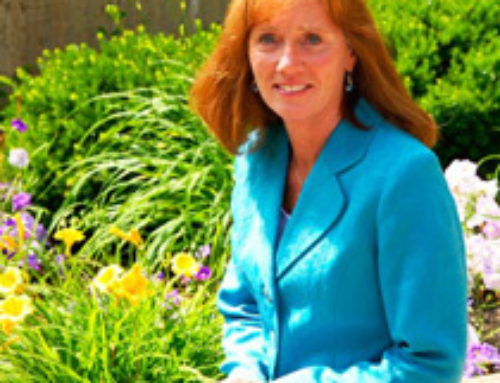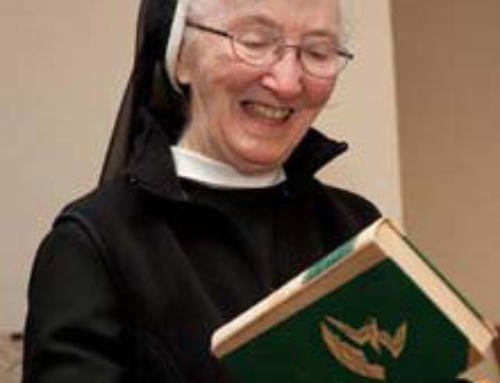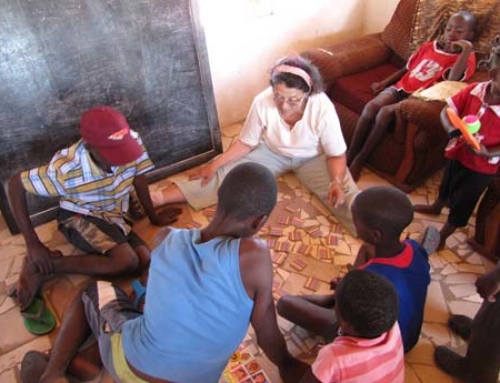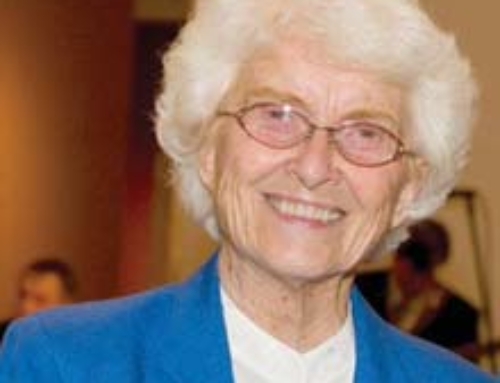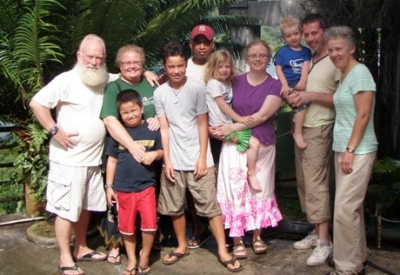 Jean Ranahan '67, lives in Micronesia, a nation comprised of hundreds of small islands in the western Pacific Ocean.
Jean Ranahan '67, lives in Micronesia, a nation comprised of hundreds of small islands in the western Pacific Ocean.
Here is what Jean writes about life in that lush land ...
Temperatures here on Pohnpei range from mid 70s to high 80s year round, and humidity is 80 to 90 percent. The annual rainfall in my town of Kolonia is about 190 inches, while the interior mountains of the island receive about 400 inches a year.
I love the rain. I love the hushing sound as it approaches down the forested mountainside. Then it thunders onto my roof and splatters into the mangrove swamp just off my porch. These showers last from a few minutes to several hours and are often followed by magnificent rainbows arching over the harbor and ending in the cove near that red roofed building beneath Sokehs Rock.
My life here is much like life anywhere else. I am an instructor at the College of Micronesia, I teach my classes and then go home to cook dinner.
I teach ESL level courses in writing and in business English at the Pohnpei campus of the College of Micronesia. My students are wonderful people, exceptionally kind and respectful. However, academically, they are not very good students. The local schools do not prepare them well.
Pohnpei is a great place to be at my age. The older that one is, the more respect one deserves. Another interesting part of the culture is the royalty system. Each of the five municipalities on Pohnpei has a Nahnmwarki, or king. When a Nahnmwarki calls for a meeting or a feast, all of his people attend regardless of school or work obligations. Surprisingly, funerals are extremely important and prestigious affairs. They last many days, require great amounts of food and the attendance of everyone who has any connection with the deceased or the family of the deceased. “I have a funeral,” is a common and truthful excuse from work and school.
For virtually all of the Pohnpeians I know, the island’s traditional life takes precedence over Western life, meaning school, work, business, and government are carried on with constant interruptions and delays. Some days I am exasperated, and some days I am resigned.
My husband, John, and I joined the Peace Corps when we were first married in ’67. We were assigned to the northern Marshall Islands and we took a trip to Micronesia. We spent one day on Pohnpei (at the time its name was Ponape.) I wrote to my parents and told them that Ponape was the most beautiful place that I had ever seen. I loved its lush mountains and profusion of flowering plants.
We returned to the Marshalls and our oldest daughter, Lisa, was born there. After finishing Peace Corps, we taught in the public school system on Majuro, the capital of the Marshalls, where our second daughter, Emily, was born.
When it was almost time for Lisa to start school, I insisted that we return to the United States. While we loved the islands, I insisted that our girls needed more educational opportunities than they would have if we stayed in Micronesia. Lisa was an exceptionally good language student and when she finished college she decided to join the Peace Corps, requesting a posting in French-speaking Africa. The Peace Corps had no openings there, but asked if she would like to return to Micronesia. She was assigned to Pohnpei, and in her first letter to us she wrote that she felt as if she had come home.
Lisa stayed on Pohnpei, where she has lived for the past 17 years with her Pohnpeian husband. They have two sons. On one recent visit, a friend asked my husband to help set up and operate a scuba dive business here on Pohnpei. We had both just retired from teaching, and John was delighted to do what he had always really wanted to do. I was dismayed to think that I would be living in such a small community without a purpose to my days. So I applied for a position at the College of Micronesia.
Tell everyone that there is a good story here that you must come to research. Lots of geography buffs and writers come to Micronesia and find a lot that is of interest. Some never go home.
